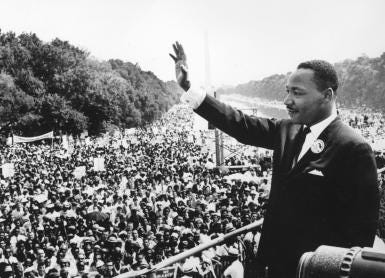Martin Luther King Jr. was assassinated in April of 1968. It was fifteen years later in 1983 that the Martin Luther King Jr. National Holiday was passed nationally (sponsored by Republicans and Signed by Reagan). While some states enacted the holiday in recognition of Dr. King’s accomplishments in a short 5 years after his death (Connecticut and Massachusetts), others such as Arizona and New Hampshire waited until the mid to late 1990’s before fully recognizing the holiday.
For those of us born after 1980, I think we have the understandable recency bias that Martin Luther King has always been the one universally accepted example of peace and appropriate civil rights activism. But in reality, he was a character whose actions actually annoyed, frustrated, and angered a very large percentage of our population at the exact moments of the events for which he is now famous.
That same recency bias might lead one to assume that all of the important social progressions we’ve been fortunate enough to experience since the 1960’s would have somehow happened on their own, that it just took a gentle nudge from Dr. King before presiding forces in America came to their senses.
The point of this history lesson is that both in that time and in this one now: topics related to race dominated the news cycles, most citizens in the majority just hoped for everything tumultuous to stop, not every Black American agreed with the movement, there were several attempts at harming leaders of the movement, not just on their lives but also on their character, and anyone associated with the moment was considered a “rabble rouser”.
What we consider as normal now, was pushed for hard, but most importantly, against the grain, at some point in the past. A “new normal’ had to be established and then continued before it was accepted as an unremarkable element of society. My own parents, both growing up in Texas, were amongst the first groups of children to integrate into previously all-white schools. I’m one generation away from having spent some of my education in “Coloreds Only” school buildings, rather than having access to the boundary-less options I was lucky to have offered to me.

Martin Luther King, Jr. Photo © Agence France Presse/Getty Images
So I ask you this: Given what was the dominant culture at the time, given a nationwide general apathy for the rights of African-Americans, given a widespread desire to keep the status quo, in 1963 when Martin Luther King Jr. marched on Washington and gave his infamous, many time quoted “I Have a Dream” speech, where would you have stood on these issues? As you consider what that stance might be, reopen your mind to a large group of people in today’s time being constantly told they should shut up in the context of constant and inescapable fear and frustration. If you’re silent in the wake of their pain, but then become upset when violence affects one of your proxies, you don’t get to take Martin Luther King Jr.’s quotes out of context and use them to further your own unrelated cause. Never forget that King fought first and foremost for the underprivileged and the disenfranchised.
You should instead try and avoid the wrong side of history.


